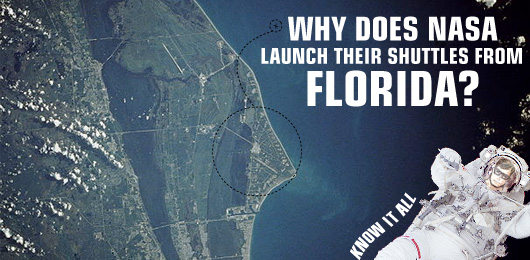Everybody has that moment when they realize they don’t know about something that they should probably know about. Whether it’s history, language, science, or cultural phenomena, you’ve felt the stinging personal embarrassment of a moment wherein you realize there’s some common knowledge that isn’t so common. Don’t feel bad; nobody knows everything. Nobody, that is, except me and my sidekick, The Internet!
Somewhere in the world, a confused soul begs the question…
Why Does NASA Launch Their Shuttles from Florida?
It seems like before every space shuttle launch from Cape Canaveral, NASA encounters some delay by way of weather, leading most people to wonder “why have it in a state that frequently deals with rainy weather?” Blast off.
There are three simple reasons why NASA doesn’t mind the finicky weather of the Sunshine State and will not move their base of operations to a weather utopia like southern California anytime soon:
- Florida is closer to the Equator than any other part of the contiguous 48 United States. The Earth’s linear velocity is fastest at the Equator (translation: the Earth spins “fastest” at its center) and any launch made close to the Equator can better take advantage of the Earth’s natural rotational speed, thus saving on fuel, rocket power, etc. For comparison, the European Space Agency uses a launch site in French Guiana (5 degrees above the Equator).
- Florida is on the East Coast. To travel with the Earth’s rotation as mentioned above, a launch from any place in America must travel east. Therefore, if a shuttle lifted off from a place like Los Angeles, it would have to fly over America as it gained altitude and though shuttle debris/disasters are rare, if something were to go wrong after take-off, NASA felt it was better for that to potentially happen over the ocean.
- When the Space Center was erected, the area around Cape Canaveral was basically a very rural beach within decent driving distance of both a Navy and Army base. Despite the low population density, there was infrastructure in the area for transportation, allotting the Space Agency a fair amount of privacy and reasonable isolation (not the case with more southern American locations like Hawaii or Puerto Rico).












![It’s Time to Begin Again: 3 Uncomfortable Frameworks That Will Make Your New Year More Meaningful [Audio Essay + Article]](https://www.primermagazine.com/wp-content/uploads/2025/01/begin_again_feature.jpg)



